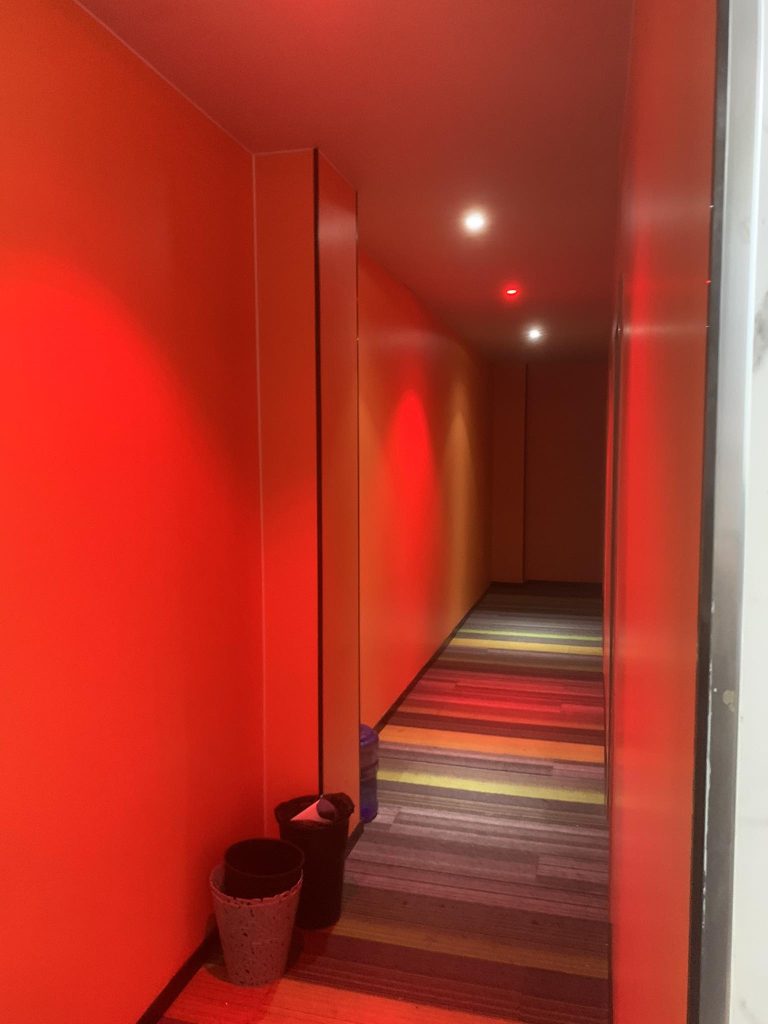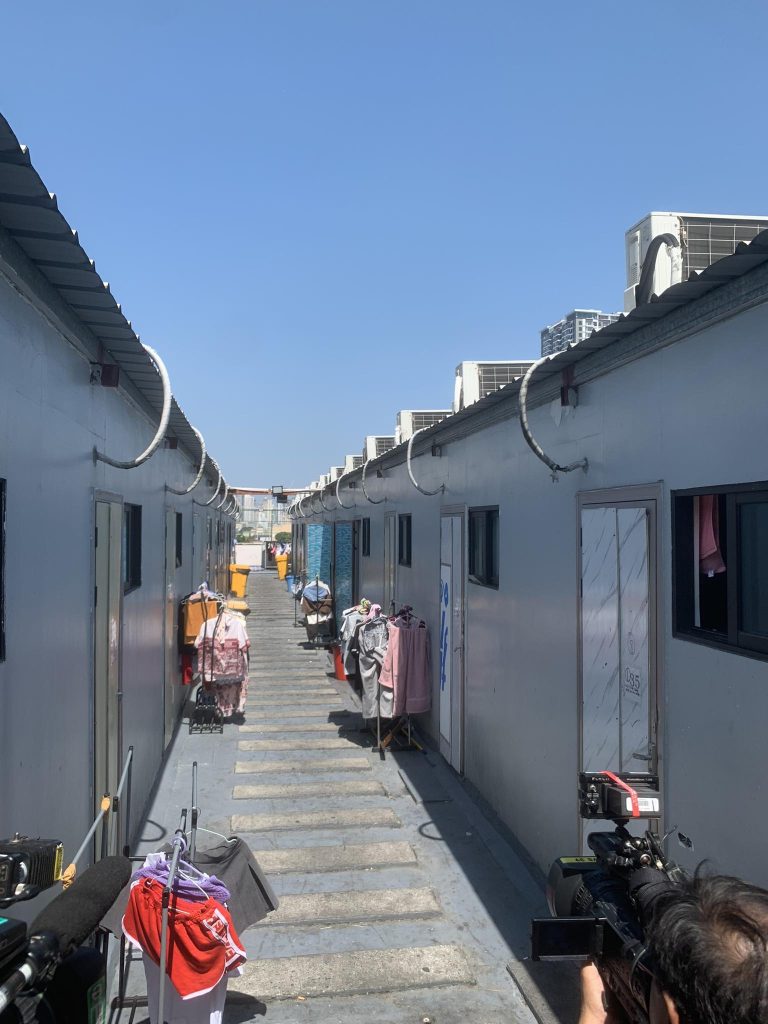Will the Philippines become a ‘scamming’ country?
The fetid smell wafting from the several rooms littered with condoms that dotted a red-lighted hallway a few steps away from what they call “aquarium” evokes passions of the flesh. Lurid details of sexual services are offered in a menu for patrons in a “self-contained” area.
This is not however some cheap hotel or motel operations, but rather a prostitution den right in the nerve of a Philippine Offshore Gaming Operator (POGO), which are now called Internet Gaming Licensees (IGL), at the Nasdake Building in Pasay City.
The IGL, identified as Smart Web Technology, has since closed after the raid conducted on October 27, 2023, led by the Presidential Anti-Organized Crime Commission (PAOCC), Inter-Agency Council Against Trafficking (IACAT), Philippine National Police, and the Women and Children Protection Center. Some 731 workers had been discovered in the high-walled facility that is near the Pasay City Hall, and the Pasay Police Station.
The “aquarium” is a viewing chamber similar to massage parlors where you can choose from among the trafficked women on duty mostly Chinese, Vietnamese, Korean, and Filipino women. These women, however, do not give massage but engage in sexual services. The building also has KTV rooms, spa, restaurants, barber shops, to serve the workers, which Justice Secretary Jesus Crispin Remulla described as a “self-contained” community.

The Nasdake sex den.

Condoms at Nasdake sex den litter the area.
As in any raided IGLs in the Luzon Island, all of them are involved in love scams, human trafficking, fraudulent crypto investment, labor trafficking, illegal detention, and torture.
On Monday, March 25, PAOCC spokesman Winston Casio took iOrbitNews and several mediamen to the blood-stained torture chamber on the lower level of Nasdake Building. At the torture chamber, Filipino and foreign workers who did not meet their “quota” were tied to a 15 to 20-foot L-type bar and subjected to unspeakable torture – hit with baseball bats, baton and rattan sticks, electrocuted with tasers, or shot with airsoft guns.
Just two months before the Nasdake raid, an IGL operation of Rivendell Gaming Corporation, was also shut down in Pasay City, where 650 workers – 464 Filipinos and 186 foreigners — were taken into custody.
Nasdake as Detention Center
Casio said the Nasdake Building now houses the Department of Social Welfare and Development, and the Cyber TIP Monitoring Center of the Department of Justice, IACAT, and the National Bureau of Investigation.

More than 300 foreigners mostly Chinese and Vietnamese are temporarily housed in three shelters awaiting deportation.
The Nasdake building also accommodates some 300 foreign workers who were taken custody after series of raids conducted against illegal IGLs in the Luzon Island alone.
The illegal foreign workers are staying at the topmost floor of the Nasdake Building. Most of them have no “Offshore Gaming Employee License” or OGEL that is provided by the Philippine Amusement and Gaming Corporation.
Casio estimates there are now 480 illegal online gaming operators all over the country and they had conducted operations only against five so far. Casio has said the government is spending some P35 million every four months with the food and deportation proceedings of foreign workers because their embassies have no funds for the airline tickets of a large number of their compatriots.
One of the Chinese workers currently awaiting deportation proceedings said he has nothing to do with the illegal activities and was working as a chef when arrested. But Casio was quick to refute the allegation of the Chinese man noting “the Philippines is not short of chefs and he (Chinese man) is not even a Michelin Chef” to warrant his stay in the country.
Casio later presented “Dylan” and “Dani” – two of the five foreign IGL workers who were rescued recently. “Dani,” the Vietnamese has maintained that he was tortured and managed to escape the POGO facility. Casio has also “belied” allegation that services of “Dylan” and “Dani” were terminated by their employer.

Blood-stained torture chambers at Nasdake
Lack of Regulation?
The presence of a large number of Chinese workers had been first reported back in 2022 during the COVID-19 pandemic when iOrbitNews reported the underground hospital that treated Chinese workers inside the Fontana Leisure and Resorts.
In May 4, 2023, the PNP Anti-Cybercrime Group raided the 2.5-hectare premises of the CGC Technologies and Sun Valley Clark Hub Corporation, a sub-lessee of the Donggwang Clark Corporation II. CGC Technologies has hosted Colorful and Leap Group Company (CLGP), the firm that was involved in love scam operations, forced labor, and torture, inside the Clark Freeport Zone. Some 437 Vietnamese had been lured to work in the Clark scam hub. The Clark POGO maintained a torture chamber similar to the one at Nasdake.
In October 2022, some 16 Thailand nationals were rescued in a POGO hub inside Fontana who were allegedly being held by their employer and forced to work beyond official working hours. It was the first reported case of forced labor in a POGO hub inside the Clark freeport.
The sub-lease agreement between Donggwang and SVCHC was approved by state-run Clark Development Corporation on January 16, 2019, the peak of POGO operations in the country.
The CDC, who was caught by surprise, has since then created the Clark Security Advisory Council, in a bid to check the unabated operations of IGLs within Clark. It said it will scrutinize the processing of new lease and sub-lease applications of IGLs.
Gatchalian Probe
Will the Senate investigation into the operations of an IGL in Luzon the beginning of the end of the IGLs?
The Department of Finance noted the Bureau of Internal Revenue (BIR) managed to collect P8.88 billion in taxes from IGLs in 2022. The IGL’s contribution to gross domestic product (GDP) was reportedly negligible at around 0.2 percent for 2023, a decline from the 0.7 percent during its peak in 2019.
Senator Sherwin Gatchalian and the economic team currently support the move to permanently ban the online gaming industry. Both the Department of Finance (DOF) and the National Economic and Development Authority (NEDA) are backing the move to ban online gaming operations and declaring then as illegal.
In February, the House Games and Amusements Committee has approved two measures seeking to ban IGLs amid the government’s apparent failure to address crimes related to online gaming.
House Bill 5082, seeks to disband and tag as illegal all IGL operations in the country, while House Resolution 1197, calls for a government ban on the operations of IGLs. The House bills were sponsored by Rep. Bienvenido Abante (Manila, 6th District) and Rep. Rufus Rodriguez (Cagayan de Oro).
NEDA Assistant Secretary Sarah Lynne Daway-Ducanes has argued the potential negative impact of IGLs outweighs its minimal economic contribution.
China has already warned the Philippines to stop the operations of IGLs. Ducanes also said the country risks being included in China’s blacklist of tourist destinations.
Ducanes said the Philippines economy stands to lose 0.8 to one percent of GDP if the Chinese tourists stop coming into the Philippine shores. The economic team wanted revenues from more legitimate industries amid the seemingly unstoppable fraudulent activities being done by IGLs.
But the Philippine Amusement and Gaming Corporation, the government agency tasked to regulate IGLs, said it will conduct intensive monitoring, data sharing, and inter-agency coordination to prevent abuses by IGLs.
For 2023, PAGCOR noted revenue reached P285.27 billion, a 33.1% increase from P214.33 billion reported in 2022. The country’s integrated resorts posted P207.48 billion, followed by the electronic games sector at P58.16 billion. PAGCOR reported more than 90% increase in online gaming activities in 2023 compared to the previous year.
Data from PAGCOR showed the e-gaming sector recorded P58.16 billion in revenues in 2023, up by 92% from the P30.24 billion in the previous year. This comprises e-games, e-bingo, specialty games, and sports betting.
It recorded 1,000 licensed e-gaming sites last year, with more awaiting their provisional licenses.
The Department of Finance noted that total tax revenues from POGOs reached P8.878 billion in 2022, up from the P3.91 billion posted in 2021; P5.28 billion in 2020; and P8.02 billion in 2019.
With a legal leg to stand on, the IGLs are here to stay. Unless the lawmakers will have their way and permanently ban the imported scourge of unabated scams. The government has done it with online sabong, and there is no reason why it cannot do the same with IGLs.




